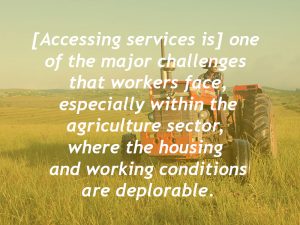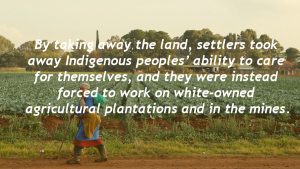
Denboy Kudejira
Over the past seven years, the On The Move Partnership has researched a wide variety of employment-related geographical mobilities (E-RGM) to and within work. On the Move’s focus has been on the Canadian context including people coming temporarily to Canada for work from countries in the Global South. Little research has been done on temporary mobility for work within and between countries of the South, either by On the Move or more generally in the academic literature. This is an area of neglect that Denboy Kudejira is aiming to rectify.
Denboy Kudejira joined On the Move as an affiliated student in Winter 2019. He is a PhD student in the Department of Anthropology at Memorial University studying the working and living conditions of undocumented Zimbabwean migrants who are working in the agriculture sector in South Africa. He was asked to apply the OTM spectrum of mobility approach that includes attention to internal and international mobilities for work to existing research on internally and internationally mobile agricultural workers in South Africa to see how it might add to our understanding of E-RGM in this Global South context.
Denboy’s Ph.D. research is looking at what factors are pushing undocumented Zimbabwean workers to join the agriculture sector in South Africa, the challenges they’re facing, and broadly, how they are surviving. His work includes exploring what strategies they are using to survive, what conditions they face on the farms, and the extent to which they are protected by the government in South Africa.
Recently, I had the opportunity to chat with Denboy about his research and how it relates to the On the Move Partnership.
Q: First of all, what inspired you to go into the field of studying migrant agricultural labour in Southern Africa?
It’s my background. For the past 15 years, I’ve been working in the non-profit sector in Zimbabwe, working with poor households helping them to achieve their life needs. Through that work I have been exposed to some of the challenges that poor people face and how these challenges drive individuals to make certain decisions. I also give credit to my educational career. I obtained a Master of Arts in Sustainable Development from Brandeis University (USA), where I explored global development issues, and issues in agriculture was one area of focus. But my recent MPhil project with the University of Western Cape in South Africa, lured me into pursuing further research in migration and agricultural work. Through the MPhil research I captured individual Zimbabweans’ experiences crossing the border and working on the farms. While I gathered a lot of information about their living and working conditions, I was also left with so many unanswered questions – including how do they relate with local South Africans? And how do they maintain ties with families back home during their stay in South Africa? So my PhD is building on that and expanding my understanding of the situation of undocumented Zimbabwean migrants who are working in South Africa’s agriculture sector. That has been my journey.
Q: Why are these workers choosing to work in South Africa without getting work permits?
A: There are quite a number of factors. One reason is that, because of the economic situation of Zimbabwe, it’s been very difficult for citizens to get passports. Currently an ordinary passport that normally takes 3 months to get is taking up to 8 months. It is also fairly expensive to get a passport, so if someone does not have any sources of income, that becomes a problem. Another reason is South Africa’s strict immigration regulation. Workers have to prove that they have employment before they can be given a work permit. The potential employer also has to prove that there are no local applicants qualified for the same job. Because many agricultural jobs require unskilled labour, it becomes difficult for the potential employers to demonstrate that there are no South Africans suitable for the same jobs. The agricultural labour market has also been heavily casualized and, as a result, farmers only maintain a small number of permanent workers and employ seasonal workers during planting and picking periods. The increased casualization, and the growth of other better-paying sectors, make agricultural jobs less attractive to local South Africans. Farmers therefore take advantage of the large pool of undocumented Zimbabwean migrants entering South Africa as a source of cheap labour. Because most of the workers are employed on short-term contracts, farmers are reluctant to help the migrants regularise their stay on the farms.
Q: Because they’re undocumented, are the Zimbabwean workers able to access services offered by the South African government?
 That’s one of the major challenges that they face, especially within the agriculture sector, where the housing and working conditions are deplorable. They are not able to get access to services like healthcare, insurance, and other basic services. This is mainly because of the remoteness of the farms from those facilities, and also because of their legal status. They fear that if they get off the farm, they can be apprehended and deported back. Though the South African legal framework provides equal rights to everyone, including non-residents, the undocumented Zimbabweans do not have access to those rights.
That’s one of the major challenges that they face, especially within the agriculture sector, where the housing and working conditions are deplorable. They are not able to get access to services like healthcare, insurance, and other basic services. This is mainly because of the remoteness of the farms from those facilities, and also because of their legal status. They fear that if they get off the farm, they can be apprehended and deported back. Though the South African legal framework provides equal rights to everyone, including non-residents, the undocumented Zimbabweans do not have access to those rights.
Most Zimbabweans in South Africa are not aware of the country’s legal instruments and how they are protected by those instruments. But even when they are aware, most undocumented workers are reluctant to approach the police or the courts when their rights are violated because they don’t have legal documents to live and stay in South Africa. So that fear, that if I go out of the farm I will be arrested, keeps them hidden in the farms, where the services are also very terrible.
Q: Is the movement of Zimbabweans to South Africa a recent phenomenon or part of a longer migratory history?

Pre-colonial tribes in Africa were migratory but when settlers came in the late 19th Century, they enforced arbitrary borders and pushed Indigenous Africans to congested communal reserve areas, dividing families. In South Africa, these reserves were called Bantustans or homelands. By taking away the land, settlers took away Indigenous peoples’ ability to care for themselves, and they were instead forced to work on white-owned agricultural plantations and in the mines. These workers, whether they lived in the Bantustans or other countries, were considered migrants without rights, and paid just enough to survive. Since the end of the apartheid era, there have been efforts to improve regulation of farms and migrant workers, but the recruitment of migrant labour, whether internal or international, continues to be a business strategy for plantation owners in South Africa.
Q: The On the Move Partnership has largely focused on migration within Canada and people moving here from the South. How does this contrast or complement the research you are doing on internal and international South to South migration?
A: My interest has been to contribute to ideas on how South to South mobility takes place and how, if any, there are similarities between South to South and South to North trends, so I find it very complementary to the work that On the Move is doing. I am contributing to knowledge production about movements within the South, that maybe the On the Move project can look at in the future in terms of expanding its scope, not only to focus on the North but to contribute to research in the Southern hemisphere as well. I think my research will trigger discussions on how On the Move can be broadened to explore mobility for work in Southern countries.
Q: In Canada, many people move here from the South seeking economic opportunities. Is the same true for people moving from Zimbabwe to South Africa?
A: Most people moving from Zimbabwe to other countries are doing so mostly for economic reasons, though we have had instances where political situations have pushed people out. Zimbabwe has been experiencing economic challenges for almost two decades now characterised by job losses, high unemployment rates, and increasing poverty levels. So many people are moving to neighbouring countries, and even abroad, to seek employment and livelihood opportunities. South Africa is the major economic hub of the southern Africa region so it remains the most preferred destination for Zimbabwean migrants.
Q: Here in Canada, the agriculture sector is less regulated than other industries. Is it similar in South Africa?
A: It is. It dates back to the apartheid period when the agriculture sector largely fell outside of labour relations regulation. The white minority had great influence on policy formulation, and many of the regulations were meant to protect white farmers’ interests while blacks were treated as sources of cheap labour. The native blacks worked under very terrible conditions and the colonial legislative regime was crafted in a way that denied them any meaningful labour rights. The new government, which came into power following the end of apartheid in 1994, has made headways in extending some workers’ rights to the agriculture sector, including the right to bargain for better working conditions and the right to a government regulated minimum wage. There are still some gaps, however, in the sense that the regulations are not effectively monitored and no practical steps have been taken to protect undocumented migrant farm workers from exploitation by the farmers.
Q: Are there other ways that the experience of migrant workers in South Africa compares or contrasts to those in Canada?
They are different in terms of the recruitment process. Canada has a clearly defined system of recruiting short-term seasonal agricultural workers. The recruitment process between Zimbabwe and South Africa is completely different. We are just bordered by the Limpopo River and most of the people coming to South African farms from Zimbabwe are undocumented. There’s no clear framework for recruiting them and sending them back home after their contracts have ended, so you’ll find most of the guys who are working on the farms are crossing the border clandestinely and working illegally. From my research so far, I’ve found that most of them choose the agriculture sector as a hiding place from public inspection by the migration officials and by the law enforcement agents, so working in the agriculture sector is a form of a survival strategy.
Q: Does the use of undocumented migrant workers on farms make it more similar to the United States?
Yes, it’s quite similar where the Mexicans are coming in and working illegally and some go back to their home country, but because of the border policing system, it’s harder to cross the border so they’re forced to stay on the farms.
Q: Is there anything else you would like to add?
A: Conducting research among undocumented migrants is both interesting and challenging. On the one hand, you get to appreciate the personal experiences of individual migrants as they navigate their way through the precarious agricultural labour market. On the other hand, you are faced with challenges of suspicion and antagonism. For example, when I was doing field work for my Master’s, I learnt that both farmers and the ‘undocumented’ workers are always suspicious of researchers. There are perceptions that migration officers and law enforcement agents disguise themselves as researchers for the purpose of obtaining personal information, which will later be used against the farmer or the workers. I think generally, it goes to show how vulnerable the undocumented migrant workers are. They are always looking around themselves to see if someone is coming. Their income is unstable, their social life is affected. It’s really a challenge to work in the agriculture sector, especially if you are not documented.


Leave a Reply